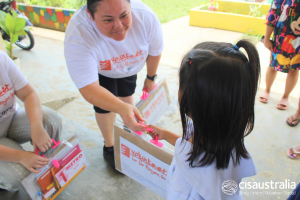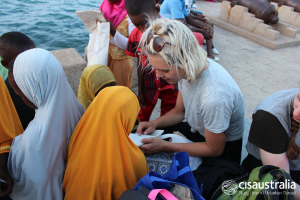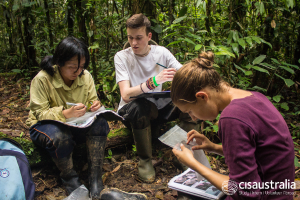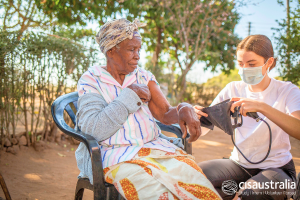Reading time: 5 – 7 min
“What if every business student had these experiences? What would the future look like if every business student participated in an environmental sustainability program abroad?”
This was a question posed by Jane O’Keeffe at the 2024 Learning Abroad Forum, and it’s one that continues to spark conversations across University campuses and academic disciplines.
In an increasingly complex and interconnected world, Learning Abroad offers more than cultural immersion. It enables students to understand how their discipline intersects with real-world challenges and opens their eyes to how they can contribute meaningfully to communities around the globe.
As more universities integrate Learning Abroad into their strategic priorities, the conversation broadens further: what might higher education look like if every student had access to a Work-Integrated-Learning (WIL) abroad experience as part of their degree? And how could this reshape the way graduates engage with their profession, their communities, and the broader global context?
What is Work-Integrated Learning and Why Does It Matter?

Work-Integrated Learning (WIL) is a structured form of experiential education that integrates academic learning with practical community and environmental engagement. Unlike general volunteering or tourism, WIL programs are intentionally designed to create authentic, hands-on experiences for students to apply their classroom knowledge to complex, real-world challenges.
These experiences offer significant benefits for students, institutions, and communities, with a strong emphasis on sustainable development and long-term impact.
At CISaustralia, we partner exclusively with local organisations that are committed to sustainable, long-term community-led change. For example, our local partners in Peru are working directly with communities on environmental conservation and sustainability initiatives that strengthen ecosystems and provide lasting benefits for future generations.
These projects are aligned with the United Nations Sustainable Development Goals and span areas including community health, environmental sustainability, wildlife conservation, community development, and education access.
Programs are scaffolded to align with institutional curriculum, ensuring they deliver not only discipline-specific skills but also essential graduate attributes such as adaptability, cultural humility, empathy, and a deeper understanding of global issues.
Learning Outcomes That Matter

The value of WIL extends far beyond the immediate experience for students and host communities. It also yields tangible outcomes for institutions. Research highlights the positive academic and professional benefits of international study and work-integrated learning:
- A study by the University System of Georgia found that students who had learning abroad experiences had a 17.8% higher four-year graduation rate than those who did not.
- According to the Institute of International Education, 90% of students who participated in a learning abroad program were employed within six months of graduation.
- At the University of California, Merced, students who participated in a learning abroad experience returned with higher GPAs than peers who remained on campus. Data also revealed;
- 97% of learning abroad students found employment within 12 months of graduation, when only 49% of university graduates found employment in the same period. That means they were twice as likely to find a job. Among learning abroad alumni, 90% landed a job within 6 months.
- 90% of learning abroad alumni who applied got into their 1st or 2nd choice grad school
- 25% higher starting salaries: that’s how much more learning abroad students earn than those university graduates who do not learn abroad
- 40% of US businesses failed to expand due to a dearth of staff international experience
- 59% of employers said learning abroad would be valuable in an individual’s career later on with their organization
Students also report enhanced communication skills, increased cultural awareness, and improved confidence in working with diverse teams in unfamiliar settings. Many describe a renewed sense of purpose in their studies and greater clarity around their future goals.
“I wasn’t too sure at the start and threw myself into it and it was the best decision I made. I had experiences which have motivated me with the direction of my prospective career as a Social Worker and me personally in everyday life. It’s confronting, exciting, challenging, emotional and definitely unlike anything else. Loved it!”
– Emma F., Deakin University, Community Healthcare and Development in Zambia
Work-Integrated Learning in Action
 At one Australian institution, the Faculty of Science Engineering and Built Environment offers a robust WIL subject in which students contribute to conservation and sustainability projects in New Zealand or Peru. They engage in field research, habitat restoration, and biodiversity monitoring to develop discipline-specific skills while gaining firsthand insight into global environmental challenges. To receive academic credit, students complete multiple assessments before, during and after their time abroad.
At one Australian institution, the Faculty of Science Engineering and Built Environment offers a robust WIL subject in which students contribute to conservation and sustainability projects in New Zealand or Peru. They engage in field research, habitat restoration, and biodiversity monitoring to develop discipline-specific skills while gaining firsthand insight into global environmental challenges. To receive academic credit, students complete multiple assessments before, during and after their time abroad.
“Since sending our first two students abroad with CISaustralia in 2013 our partnership has continued to build both in student numbers and countries on offer. We consistently place approximately 100 students each year (from the Faculty of Science Engineering & Built Environment) on CISaustralia programs to many countries globally. CISaustralia offers our students a truly life changing experience and feedback from our students is always second to none.”
– Professor Raylene Cooke, Course Director Wildlife and Conservation Biology, School of Life and Environment at Deakin University
In a similar model, one College of Health, Medicine and Wellbeing provides medical and health students with the opportunity to participate in community health programs in Thailand and Zambia. Students work with local nurses, community health centres and the local community on health promotion and education initiatives. For many, it is their first experience delivering health services in a culturally diverse and resource-constrained environment – a truly transformative opportunity.
These are not simply “nice to have” experiences. They are high-impact learning models that cultivate graduate attributes such as global citizenship, intercultural competence, and applied, career-ready skills.
Looking Ahead
 As institutions continue to diversify their approach to Learning Abroad, Work-Integrated Learning presents a compelling model, particularly for disciplines not traditionally engaged in global programs.
As institutions continue to diversify their approach to Learning Abroad, Work-Integrated Learning presents a compelling model, particularly for disciplines not traditionally engaged in global programs.
Change has been underway for some time and continues so. Faculties in business, architecture, arts, public health, social work, and education are integrating WIL Abroad into their degree structures. Institutions are creating cross-disciplinary WIL subjects open to students across faculties.
The next step is scaling these models further.
Imagine the impact if every business student contributed to a sustainability project in Peru or wildlife conservation Costa Rica, every engineering student applied their knowledge to infrastructure challenges in Zambia, or every law student explored community development in the Philippines.
These conversations encourage institutions to collaborate across faculties, share innovation across campuses, and strengthen strategic international partnerships. When global learning is done well, the benefits extend far beyond the individual student. It enhances institutional outcomes, fosters global perspectives, and supports meaningful, community-led change.
Get in Touch
Curious about how you could integrate a Work-Integrated Learning (WIL) program into your faculty or school?
CISaustralia collaborates with institutions to develop short-term, academically grounded programs that meet WIL criteria and enhance student learning outcomes. With over 38 formal university partnerships and more than 12 years of providing study abroad and WIL experiences, we are well-positioned to help you design impactful programs aligned with your academic goals.
Contact our Founder and CEO, Brad Dorahy to discuss how WIL programs can support your institutional priorities.
